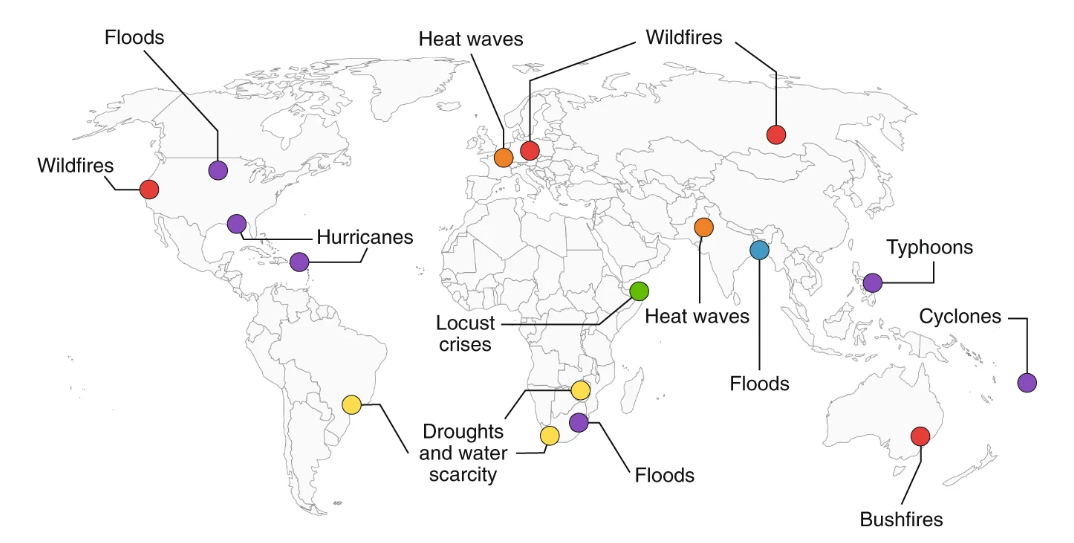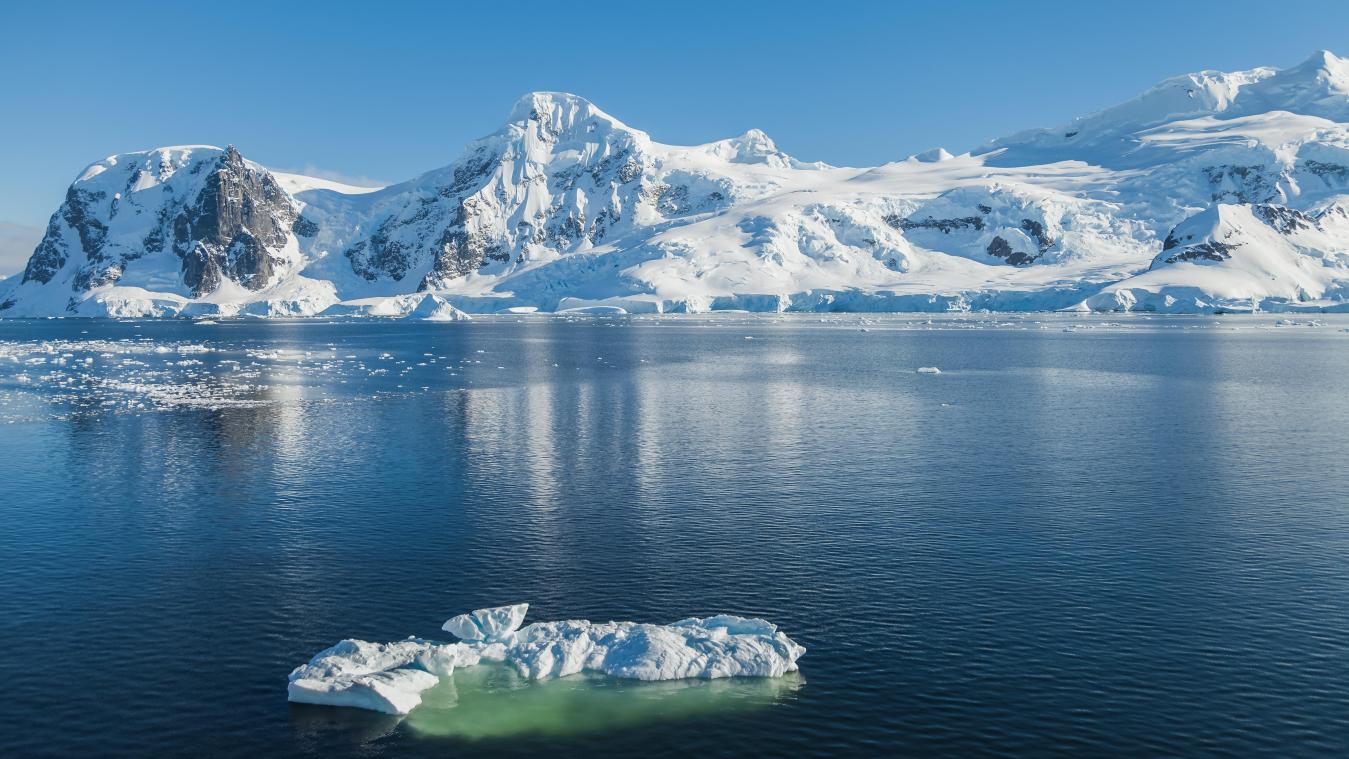During Covid-19, the climate crisis continues. It gets worse. The media, all focused on the pandemic have forgotten it a little, but the climate crisis has not disappeared and extreme events have multiplied around the world in recent weeks. They come at the worst possible time, when economies are collapsing and populations are at the end of their rope. The scenario of a collision between climate risks and pandemic risks is unfolding; it will happen again because the climate is out of control and pandemics will follow one another as man encroaches on natural habitats. To respond to this explosive cocktail, populations, States and international organizations must mobilize now. Solutions exist and must be implemented without delay. They will require a global revolution of consciousness.
The urgency of the Covid-19 crisis has mobilized all the attention and has strongly overshadowed the climate crisis. However, while the epidemic was spreading all over the world and claimed more than 517,000 victims to date, while unprecedented constraints were affecting the daily lives of billions of human beings, while economies were on the sidelines, during this time of astonishment, climatic events were accelerating. Factory closures around the world have led to a sharp drop in greenhouse gas emissions, but this drop is far from having been enough to shake the thick layer of gas already enveloping the planet. Several climate risks have collided with the epidemic itself or have jeopardized sensitive public health actions. While the specific nature of the threats will change with the seasons and regions, the global problem is universal and should be seen as a sobering signal of what lies ahead for countries around the world.
Cumulative Events
Let us be clear: when we talk about climate risks, we are not talking about future risks with an uncertain horizon. We are talking about risks that are happening right now and that are affecting the planet everywhere at once. A report published by the journal Nature Climate Change makes it a non-exhaustive inventory.

Fiji was hit by a Category 5 tropical cyclone at the onset of the outbreak; Vanuatu, Solomon Islands and Tonga will also be facing difficulties environmental conditions while preventing the introduction of the virus. The Gulf Coast of the United States is preparing for a severe hurricane season, while the state of Louisiana has become a national Covid-19 mortality hotspot, in part because of a legacy of racial discrimination and underinvestment in health care. In South Africa, local authorities are struggling with how to maintain social distance during floods in informal settlements where policy is already extremely difficult to implement. In Zimbabwe, the drought has deprived millions of people of access to clean water and exposes them to a food insecurity acute during the period June-September 2020. These consequences, as well as drought-related power cuts in southern African countries heavily dependent on hydropower, will affect the response of these countries to the virus.
In addition, the coming year could be the warmest on record. Extreme heat events, such as those beginning in northern and southern Europe, the Middle East, where Florida and the southwestern United States have already experienced heat waves this year, could lead to particularly high excess mortality and morbidity, and will likely disrupt power supplies, hospitals and emergency services, especially in cities. This is likely to have serious consequences for people who are already at high risk of heat-related illness, including the elderly, people living in poverty (especially those who cannot afford air conditioning), people with pre-existing health problems, incarcerated persons, the homeless and persons with reduced mobility or disabilities. Forest fires will also intersect with the spread of Covid-19 in the western United States in the coming months, especially as the pandemic disrupts forest fire prevention measures and training plans fire department. This challenge is already apparent in Australia, where the long-lasting health effects of air pollution caused by an extreme bush fire season are likely to exacerbate Covid-19-related morbidity, and the epidemic will place further strain on health services and the economy.
Worsening of extreme events
On an even larger scale, a combination of climatic and geopolitical stressors is leading to forced migration. Displaced populations, such as those residing in refugee camps, are more exposed than others to Covid-19 epidemics due to living conditions incompatible with social remoteness and lack of access to testing or health care. Pandemic-related border closures further exacerbate these problems.
These problems are not new; drastic changes in weather conditions, shrinking habitats, land degradation and an increase in the number of fires caused by climate change have a direct effect on the emergence of new diseases.
However, the scale of these events makes them increasingly unprecedented. And the longer their effects last, the more they also cripple local economies. This has the effect of lengthening the recovery time of a country, making it more vulnerable than usual to other disasters.
Every disaster brings its share of suffering, but things get more complicated with disasters that accumulate. They are not just two phenomena that occur at the same time. They are two phenomena that aggravate each other. For example, Australians are concerned that a season of extreme bushfires could increase regional air pollution, making them more vulnerable to the development of severe Covid-19s, and could seriously affect people who are already at high risk of heat-related diseases, including the elderly, the poor, the disabled and the homeless. These consequences will, of course, put a severe strain on health systems and the economy.
This synergistic effect is accentuated not only by the force of the disaster itself, but also by underlying conditions such as widespread malnutrition, poverty, weaker health systems and the suspension of routine public health programmes against other diseases due to excessive concentration on a single disease, such as Covid-19. The additional negative impacts of extreme weather events on economies and livelihoods, reinforced by climate change, threaten to push countries, especially developing countries, to their breaking point, rolling back decades of work to reduce poverty and improve human well-being.
Our lot in the future
To understand the situation, one has to imagine, for example, how Cyclone Amphan appeared in India and Bangladesh at the same time as the Covid-19 epidemic was raging. These countries have become accustomed to dealing with these climatic situations over and over again and have made enormous progress in terms of early warning and infrastructure related to these disasters. But the collision between the epidemic situation and the climate situation has turned everything upside down, accentuating the threats to both. Arivudai Nambi Appadurai, Director of the World Resources Institute in Bengaluru, India, esteems that these "compound extremes" will be our lot in the future. " There are many challenges, including overcrowded storm shelters that can become viral clusters and outbreaks of other diseases triggered by the effects of a cyclone, mainly due to flooding. ", he explained. "The risk of spreading cholera and bacterial infections such as diarrhea is high in storm shelters. Lack of water and sanitation facilities will exacerbate the spread of the epidemic and pandemic. ".
As noted in the Nature Climate Change, " on an even larger scale, a combination of climatic and geopolitical stressors leads to forced migration ». Displaced persons, including migrants and refugees in camps, are particularly at risk of infectious disease outbreaks because of their living conditions, the centrality of promiscuity - a kind of social antidistance - in their lives and, of course, their lack of access to testing and care. In one way or another, large-scale migration will directly affect the local dynamics of infectious diseases. « Local people would have become accustomed to local infections " Katie Bays, co-founder of the consulting firm Sandhill Strategy, said Rajan Patil, a public health epidemiologist at the University of Chenai in India. " But the exposure of such naïve populations, who have never been exposed to new infections such as COVID-19, will trigger an epidemic because they will have no immunity. ".
Dilemma
But evacuation and displacement " are the kind of situations that could cause unavoidable damage - so the sooner we can stop epidemics, the better. "says Colin Carlson, a professor at Georgetown University's Center for Global Health Science and Security and co-author of the report. « The longer the pandemic lasts, the more inevitable tragedies will occur, where evacuations produce a super spread and people die unnecessarily. ".
At the time of writing, India and Bangladesh, struggling with Covid-19, are displacing hundreds of thousands of people to overcrowded shelters to avoid being hit by the cyclone. Evacuating people to cyclone shelters saved hundreds of thousands of lives in previous storms, but aid workers now fear that the virus could spread quickly in the shelters.
On the other side of the world, in anticipation of a "busy" Atlantic hurricane season, the Red Cross began to consider hotel rooms rather than collective shelters, and developed plans for additional screening, masks, distance between beds, cleaning and disinfection.
The dilemma for emergency and public health services must be understood: if efforts to contain human-to-human transmission of the epidemic were to falter in the midst of a hurricane, heat wave, or major flood, it would be easy to imagine a new series of outbreaks. Recall that Covid-19 started with a single individual and quickly spread around the world. A strategy heavily based on containment - with the inevitable risk of failure - can be compromised by extreme weather events.
The United Nations Development Programme warned this week that global human development, which includes education, health and living standards, will decline this year "for the first time since the concept of human development was introduced in 1990".
The extreme climatic events of the last few days, in addition to the coronavirus pandemic, highlight, according to Corinne Le Quéré, climatologist at the University of East Anglia in England, the dangers of underestimating the impact of cumulative risks. The economic recovery policies that governments put in place after the pandemic is over, she said to the New York Times, will impact the trajectory of emissions for decades to come. « Reconstruction after the Covid-19 disaster should be designed to reduce our vulnerability. "she said. « This means both preparing for extreme climate risks and reducing the emissions that underlie climate risks. ".
Political actions
In this rapidly unfolding crisis, the authors of the Nature report call on governments, health agencies and disease experts to take immediate action to deal with Covid-19, but also to address the inevitable climate-related disasters to help minimize loss of life. Emergency response organizations and first responders are particularly susceptible to being deployed simultaneously in several crises, putting them under severe strain.
According to the authors, coordination is needed at all levels of government to prevent potential conflicts of strategy between agencies, sectors and scales. For example, this spring, communities in the U.S. Midwest faced the prospect of evacuation due to flooding as stay-at-home orders were in place.
In these and other exposed communities (e.g., hurricane zones or areas affected by forest fires), " difficult policy decisions need to be made, including whether and how hospitals - especially intensive care units - can be safely evacuated, and how to manage broader health risks in the event of large-scale emergency shelter needs. ".
In addition to responses to acute emergencies, the report from Nature Stresses that political measures are needed to ensure the continuity of basic services. « Ensuring the continuity of electricity, water and other services will be essential to limit loss of life during heat waves, fires and hurricanes. ». Similarly, when water agencies interrupt service for non-payment of bills - a situation more likely to affect people living in poverty or who have lost their jobs during the current economic crisis - handwashing becomes impossible. « In the South, rich countries need to provide budget support both to maintain these basic services in the short term and to invest in climate resilient infrastructure to manage long-term risks. ".
For Carly Phillips, lead author of the report, " Countries will need to develop detailed preparedness plans for aggravated risks, taking into account regional differences in climate vulnerability, the strength of existing health and social security systems and the trajectory of epidemics. ». In all cases, the Rapporteurs propose, governments and multilateral institutions responding to Covid-19, the climate crisis and its intersection must recognize that interventions and policies must be tailored to the particular vulnerabilities, needs and circumstances of affected populations.
A Pandemic Preparedness Strategy for Climate Adaptation
Climate change is making extreme weather events more frequent and intense. Today, because of the pandemic, they are occurring at a time when national economies are collapsing and populations are exhausted. The international community is compelled to develop a long-term strategy for pandemic preparedness, as Covid-19 is neither the first nor the last time that our globalized society will face such compounded risks.
The report's authors note that current governance and institutional structures - and the risk frameworks used in the IPCC and national climate assessment reports - are vulnerable to compartmentalization, particularly in the health sector. There is a need for more interdisciplinary and intersectoral risk assessments, including planning for low-probability, high-impact events. These assessments must explicitly consider the spatial and temporal coincidence of physical hazards and health or socio-economic risk factors, interdependencies between sectors (e.g., the link between food, energy, water and health) and the potential for feedback loops. Similarly, solutions need to be more integrated and robust, taking into account interactions, trade-offs and co-benefits across sectors and at different scales under a range of scenarios.
Health coverage
The report further states that structural racism and systemic inequalities put people of colour and the economically vulnerable at increased risk from climate change and pandemics, a situation we are already seeing developing. One of the policies to address the structural inequalities highlighted in the context of climate change and the Covid-19 epidemic is affordable universal health coverage that addresses inequitable access to preventive (addressing potential co-morbidities in pandemics and climate-related disasters) and acute (ensuring prompt treatment in emergencies) care. In many places, the current overlapping crises expose pre-existing gaps in health and social care that need to be addressed. For the rapporteurs, " Achieving the World Health Organization's goal of universal global health coverage by 2030 is essential to reducing the vulnerability of health systems and minimizing the long-term health effects of climate-related events. ». Solutions that place equity, justice and human rights at the centre will ensure the resilience of both climate change adaptation and pandemic preparedness.
Beyond universal health coverage and proactive climate resilience measures, climate change adaptation and pandemic preparedness can be seen by the authors of the report as part of the legal obligation of countries to realize the right to health through their laws, policies and budgets. « Under international human rights instruments, such as the International Covenant on Economic, Social and Cultural Rights (1966), countries have an obligation to respect, protect and fulfil the right to health, including by taking measures to prevent epidemic diseases ".
There is growing recognition that addressing climate change is a component of the realization of the right to health: the Paris agreement recognizes that in taking action to combat climate change, countries must take into account, respect and promote their right to health obligations. Strong global cooperation and governance, with a human rights-based approach - supported by appropriate legal and institutional frameworks - is a prerequisite for successfully addressing these multidimensional and overlapping challenges through integrated solutions.
Revolution of consciousness
Implementing these solutions will require a revolution of consciousness. This is only the emerging part of a more fundamental evolution of contemporary civilization, that of a change in epistemology. The historian Antoine Arjakovsky recalls in a post The recent rapid and uncontrolled, but also highly publicized, expansion of the Covid-19 pandemic has highlighted the anguish of death and shattered the illusion of industrialized, individualistic and aging societies that believed themselves to be unshakeable, even immortal. « No individual on the planet can feel safe from the risk of contamination. ». The horizon of endless progress that would be to the detriment of the life of the planet and of society is called into question; as are the pessimistic conceptions of sustainable development and the sustainable economy.
Awareness of a possible future that would satisfy the needs of everyone while preserving the world on which we depend is a crucial issue. This awareness strives to emerge between two hostile territories: that of the lack of human well-being and that of excessive pressure on the systems at the source of life. Until very recently, many people thought that the really serious consequences of an overheated planet would only be felt in a few years or even decades. Covid-19 has made us realize that this is not the case. For the first time, the inextricable links between global warming and pandemics can no longer be ignored. The pandemic, as in other areas, has played the role of a great revealer. If there is to be a revolution in consciousness, it will be, despite the deaths and tragedies that the pandemic produces, its immense contribution to humanity.














We thank you sincerely with this very brief clarification that protects us from this covid19 pendant.